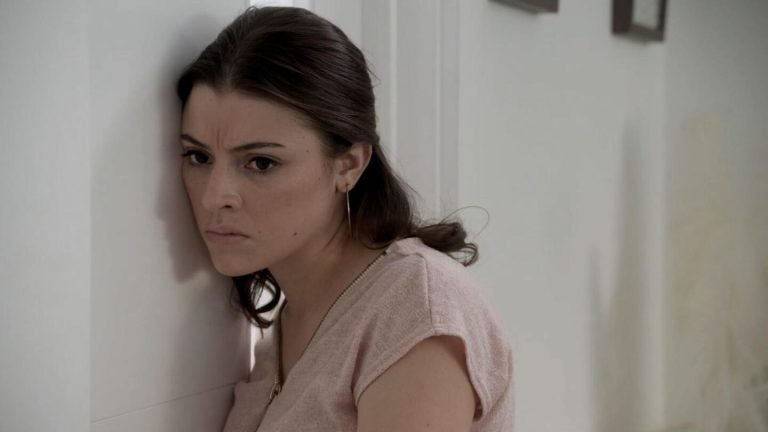Sometimes, the fate of the world is played out in the otherwise quiet local village. In “The Empire” (original French title L’Empire), Bruno Dumont’s ambitious satirical space opera opens in an unnamed fishing village in northern France, Pas-de-Calais. Visibly parodying the archetypal Hollywood colossal, primarily the Star Wars saga, Dumont’s film relocates the ancestral clash between good and evil into the banality of contemporary Earth.
The picturesque Opal Coast is thus the theater of the final phase of the conflict between the “zeros” and the “ones,” the last chance for the forces of good to defend humanity from the rise of the dark messianic figure of the Margat, alias the newly born of the emissary of evil on earth (the local fisherman Jony) who is initially put under the tutelage of the elderly and unsuspecting grandmother. In the wake of epic cinema, good and evil are once again two polarized factions whose rivalry can only evolve into mutual destruction, the inescapable actors of the battle that will finally bend humanity into being either white or black, definitely good or definitely bad.
“The Empire,” a constant reference to and caricature of commercial film patterns, in a range from the abstruseness of the “heroes’” plans in dealing with ultimately simple situations to the obligatory feminine fascination with the charms of the dark side, is nonetheless less funny and less biting than what it is conscious of being. Oscillating from functional, even if not subtle, and irreverent to boorish comedy, the movie appears more like an auteur tantrum than a sharp observation of contemporary cinema.
Lightsabers in the form of cheap neon tubes, characters suddenly caught in bizarre spasms and mutations, and tentative conversations between alien creatures and suburban dwellers all give shape to a film that, from pleasantly disorienting, quickly loses itself in overwrought and increasingly unfunny, didacticism. This is intermixed with an erratic pace, the prolonged slackening of which in the second part is but a strong deficiency in a film that should be based on a more effective satire.

The mixture of more and less successful comic moments, meaning less successful sequences bordering on the embarrassing, is never really elevated by a genuine potency of the underlying authorial gaze. In fact, beyond the signature of one of the masters of French auteur cinema, it is difficult to see what makes the film more worthy of a major festival presentation than somewhat comparable parody flicks.
The cast combines (visibly) nonprofessional actors with professional actors, as one would not guess to be. As Jony, leader of the forces of evil, Brandon Vliegh is an unremarkable presence, but then again, it is difficult to determine whether this is due to the metaphorical connotation of American stardom, of its propensity to reward mediocrity or whether it is simply due to the inexperience of the actor, being “The Empire” is her first time on the big screen.
His do-gooder counterpart, Jane, is played by Anamaria Vartolomei, a very talented young French actress (Happening, My Little Princess) who is unfortunately not particularly bright here. By and large, the cast covers the most common caricatures of popular entertainment personas (from the internally conflicted heroine to the unrepentant supreme evil leader, to the pair of feckless cops, the latter recurring characters of the director previous movies P’tit Quinquin and Coincoin), a series of outdated roles that provide no room for particular interpretive insights.
Deliberately posturing and tacky, “The Empire” may nonetheless spark a fresh discussion focused on the state of the film industry these days, yet polarized toward the contemptuous vision of niche cinema as nonetheless always superior to a cinema intended for the masses. And, despite the truth of the actual (and widespread) lack of quality in contemporary mainstream products, as much as of their very factual propensity to underestimate the comprehension capabilities of their audiences, Dumont appears oblivious to how commercial cinema, if and when done well, remains a necessary gateway to bring new generations of viewers into contact with independent cinema as well.
An overlong, uneven, and sloppy movie with only a few brilliant flashes and too many limp or unpleasant sequences, “The Empire” is an auteur’s manifesto of how cinema should no longer be made. In doing that, it fails to avail itself of any artistic or qualitative value, suffering excessively in being a derivative work of critical thinking. Released in French theaters on Feb. 21, Dumont’s film is now grappling with wider international distribution, strong from an initial in-competition presentation at the Berlin Film Festival, where it was awarded the Jury Prize. Despite the overall positive critical response, “The Empire” still falls more like a piquant, high-budget spoof movie rather than a proper piece of provocative filmmaking.



![The Fate of the Furious [2017] : An All-Out Assault On The Senses Destined To Leave A Bitter Taste](https://79468c92.delivery.rocketcdn.me/wp-content/uploads/2017/04/the-fate-of-the-furious-charlize-theron-vin-diesel-1200x630-c-768x403.jpg)
![Who We Are Now Review [2018]: A Hopeful Story mired in Despair](https://79468c92.delivery.rocketcdn.me/wp-content/uploads/2018/09/who-we-are-now-tiff-768x432.jpg)

![The Lost City [2022] Review – Sandra Bullock & Channing Tatum cannot save this stale, humorless romp](https://79468c92.delivery.rocketcdn.me/wp-content/uploads/2022/04/The-Lost-City-Movie-Review-1-768x384.webp)
